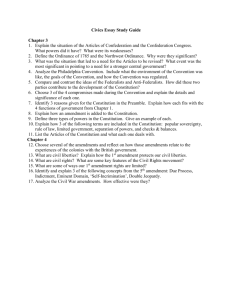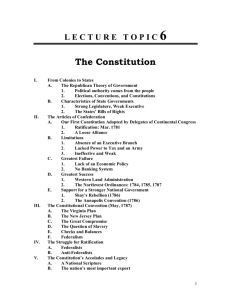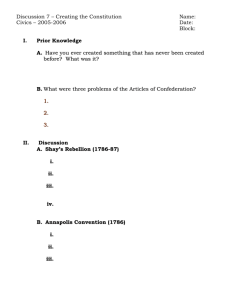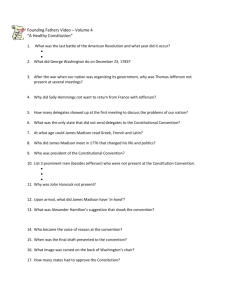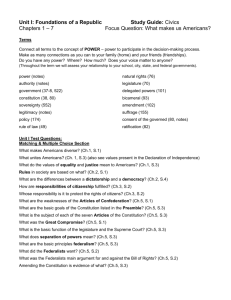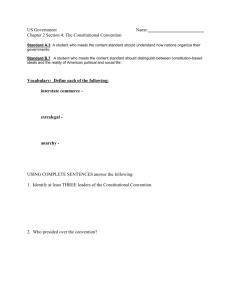To Create a More Perfect Union
advertisement
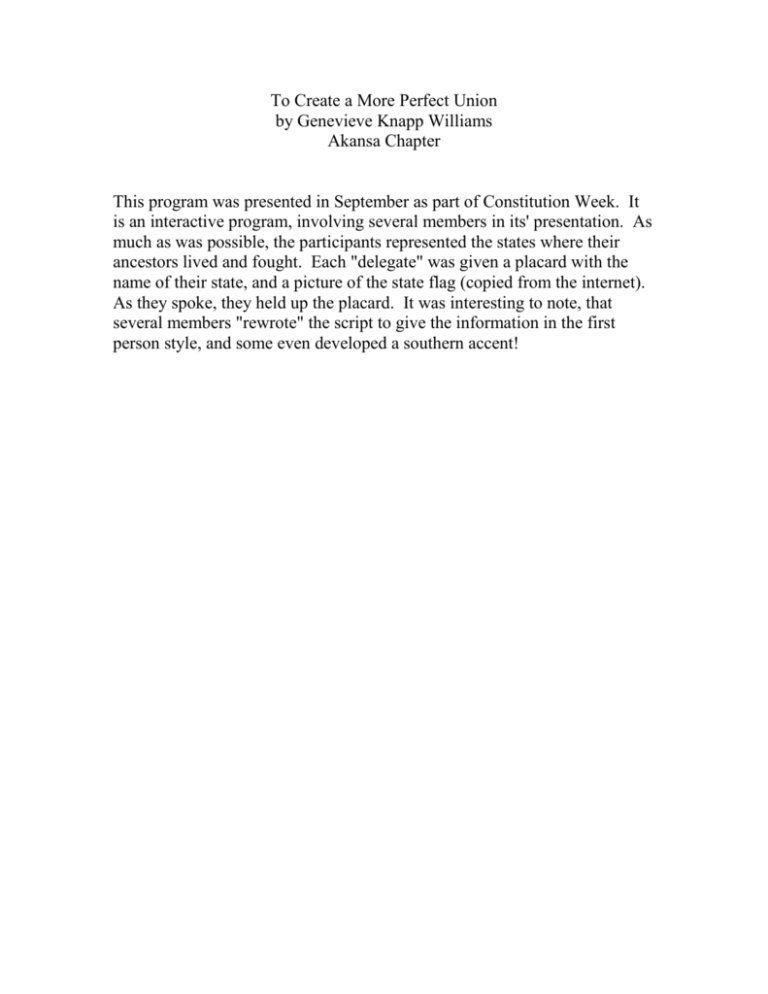
To Create a More Perfect Union by Genevieve Knapp Williams Akansa Chapter This program was presented in September as part of Constitution Week. It is an interactive program, involving several members in its' presentation. As much as was possible, the participants represented the states where their ancestors lived and fought. Each "delegate" was given a placard with the name of their state, and a picture of the state flag (copied from the internet). As they spoke, they held up the placard. It was interesting to note, that several members "rewrote" the script to give the information in the first person style, and some even developed a southern accent! Program: To Create a Perfect Union 2 TO CREATE A PERFECT UNION (Cast: 1 moderator and 14 "delegates") MODERATOR: Let me take you back to May 1787, a little more than 10 years since the Declaration of Independence - years in which each of the newly founded states have been independently governed - bound together only by the Articles of Confederation which was established as more or less a "league of friendship" without sufficient power to regulate commerce, impose taxes, support a war effort or settle disputes between the states. James Madison thought he had the answer. He wanted a strong central government to provide order and stability. He wrote, "Let it be tried whether any middle ground can be taken which will at once support a due supremacy of the national authority, while maintaining state power only when subordinately useful." Madison and a young lawyer from New York named Alexander Hamilton asked Congress to summon delegates of all of the states to meet for the purpose of revising these Articles of Confederation. Seventy four delegates were appointed to the convention, of which 55 actually attended - and some of these 55 arrived after the convention was well into the session. Freshly spread dirt covered the cobblestone street in front of the Pennsylvania State House, protecting the men inside from the sound of passing carriages and carts. Guards stood at the entrances to ensure that the curious were kept at a distance. Robert Morris, the financier of the Revolution, opened the session with a nomination - Gen. George Washington for the presidency of the Constitutional Convention. The vote was unanimous. His very presence lent an air of importance and legitimacy to the proceedings. Washington, suffering from rheumatism, despondent over the loss of his brother and absorbed in the management of Mt. Vernon, had nearly declined the invitation to attend the Convention. On Tuesday morning May 19th, Edmond Randolph, the tall 34 year old Governor of Virginia opened the debate with a long speech decrying the evils that had befallen the country under the Articles of Confederation and stressing the need for a strong national government. He presented a plan (that he and his Virginia compatriots had put together at the Indian Queen Tavern in the days just preceding the convention), which had three branches Program: To Create a Perfect Union 3 - legislative, executive and judicial - with each branch structured to check others. For 10 days the members of the convention discussed this sweeping and to many delegates, startling Virginia resolution. This "nationalist" position revolted many delegates. An alternate plan, representing the interest of the smaller states, was proposed by William Patterson of New Jersey on June 13th. This plan, which called only for revisions of the Articles of Confederation was soon rejected. On June 18th, Alexander Hamilton presented his own ideal form of government. Calling the British government "the best in the world", he proposed a model strikingly similar to the monarchy. There were too many memories of British rule and too many bloody ties to the recent war for this plan to gain support. By the end of June, debate between the large and smaller states over the issue of representation in the first chamber was becoming acrimonious. On June 29th, the delegates of the smaller states lost their first battle, when the convention approved a resolution establishing population as the basis for representation in the House of Representatives. On a subsequent proposal that the states have equal representatives in the Senate, the vote resulted in a tie. By July 10th, Washington was so frustrated over the deadlock that he called the opponents of a strong central government "narrow minded politicians - under the influence of local views". The delegate from Maryland was the small states most effective orator, declaring, "All states have a right to an equality of representation. This is secured to us by our present Articles of Confederation; we are now in possession of this privilege." Also, crowding into this complicated and divisive discussion on representation was the North-South division over the method by which slaves were to be counted for the purposes of taxation and representation. Delegates began to realize that compromises were going to have to be made, and with this conciliatory air, a Committee of Detail was appointed to draw up a draft constitution. While Nathaniel Gorham, John Rutledge, Edmond Randolph, James Wilson and Oliver Ellsworth went to work, the other delegates voted themselves a 10 day vacation! Program: To Create a Perfect Union 4 On Monday, August 6th, 1787, the convention accepted the first draft of the Constitution. Here was the article-by-article model from this the final document would result some five weeks later. Before the final vote on the Constitution on September 15th, Edmond Randolph proposed that amendments be made by the state conventions, and then turned over to another general convention for consideration. These amendments formed the basis of the Bill of Rights. On September 17th, the delegates met for the last time. On October 2nd, 1789, President Washington sent to each of the states a copy of the 12 amendments adopted by Congress. And the signing began.... DELEGATE 1 DELAWARE is proud to claim the honor of being the first state to ratify the new United States Constitution, and voters here eagerly endorsed the attending Bill of Rights - 10 amendments designed to protect the governed from the government. The First Amendment based on the hope that men could live together peaceably is as follows: Congress shall make no law respecting an establishment of religion or prohibiting the free exercise thereof: or abridging the freedom of speech or of the press: or the right of the people to assemble; and to petition the Government for a redress of grievances. DELEGATE 2: Eight proud Pennsylvanians, led by Benjamin Franklin and George Robert Morris, signed the Constitution, and argued endlessly for its' ratification. PENNSYLVANIA was the first state to call a ratifying convention, and James Wilson's speech, praising the new government as "the best which has ever been offered", helped carry the vote by a healthy 46 to 23. With the battles of the Revolution still ringing in their ears, Pennsylvanians heartily endorsed the Second Amendment: A well regulated Militia being necessary to the security of a free State, the right of the people to keep and bear Arms, shall not be infringed. DELEGATE 3: The great state of New Jersey, represented at the Constitutional Convention by Williams Livingston, David Brearly, William Paterson, and Jonathan Dayton, was one of the five states to ratify the Constitution by January 1788. Having suffered through the Quartering Act, which forced our citizens to house King George's troops, this Third Amendment helped sway their vote for ratification of the Bill of Rights. No Program: To Create a Perfect Union 5 soldier shall, in time of peace be quartered in any house, without the consent of the Owner, nor in time of war, but in a manner prescribed by law. DELEGATE 4: Georgia's state convention readily ratified the Constitution, but delayed adopting the Bill of Rights, feeling it was too early to start making changes. "Experience alone", they said would reveal "the defective parts of the Constitution." DELEGATE 5: William Samuel Johnson and Roger Sherman proudly signed the Constitution, representing the great state of CONNECTICUT. Connecticut was the fifth state to ratify the Constitution, and the delegates were among the first to recognize the need for amendments. The Fourth Amendment is as follows: The right to persons to be secure in their persons, houses, papers, and effects, against unreasonable searches and seizures, shall not be violated, and no Warrant shall issue, but upon probable cause, supported by Oath of affirmation, and particularly describing the place to be searched, and the person or things to be seized. DELEGATE 6: MASSACHUSETTS' delegation, led by Nathaniel Gorham and Rufus King, realized their state's ratification was pivotal to the adoption proceedings. With the Anti-Federalists agreeing only if a recommended list of amendments be included. Massachusetts ratified by a close vote - 187 to 168. The Fifth Amendment called the "very heart of the Bill of Rights protects citizens from prosecution and condemnation by the state. No person shall be held to answer for a capital or otherwise infamous crime, unless on a presentment or indictment of a Grand Jury, except in cases arising in the land or naval forces, or in the Militia, when in actual service in time of War or public danger, nor shall any person be subject for the same offense to be twice put in jeopardy of life or limb, nor shall be compelled in any criminal case to be a witness against himself, nor be deprived of life, liberty, or property, without due process of law; not shall private property be taken for public use without just compensation. DELEGATE 7: The Federalists celebrated their great 63 to 11 victory for ratification in MARYLAND, with a huge parade through the streets of Baltimore. The parade was highlighted by a 15 - foot float called "Ship Federalist". The sea-worthy craft was later launched and sailed down the Potomac to Mt. Vernon. Patrick Henry once defended the Sixth Amendment thus, "It prevents the hand of oppression from cutting you off". In all criminal prosecution, the accused shall enjoy the right to a speedy and Program: To Create a Perfect Union 6 public trial, by an impartial jury of the State and district wherein the crime shall have been committed... and to be informed of the nature and cause of the accusation; to be confronted with the witnesses against him, to have compulsory process for obtaining witnesses in his favor, and to have the assistance of counsel for his defense. DELEGATE 6: J.Rutledge, Charles Pinckney and Pierce Butler proudly signed the Constitution, representing their home state of SOUTH CAROLINA, but savage arguments about rights and amendments delayed ratification by South Carolina for several years. Thus, they welcomed the addition of the Bill of Rights. "We must remember in reading the Seventh Amendment that $20.00 amounted to about 40 day's wages in 1791! In Suits at common law, where the value in controversy shall exceed twenty dollars, the right of a trial by jury shall be preserved, and no fact tried by a jury shall be otherwise examined in any Court of the United States, than according to the rules of common law. DELEGATE 9: New Hampshire, the ninth state to ratify the Constitution in July 1788, guaranteed it's adoption as the law of the land. But ratification of the amendments involved long debates, and the standards of what constituted cruelty was only one of the issues. This Ninth Amendment is still debated today. Excessive bail shall not be required nor excessive fines imposed, nor cruel and unusual punishments be inflicted. DELEGATE 10: The great state of VIRGINIA was represented by John Blair and the boyish-looking 36 year old James Madison. Even with the influence and persuasive arguments of these great statesmen, the state conventions were slow in ratifying the Constitution - and even then, the vote was very close. This convinced Madison that a Bill of Rights was necessary, and he worked tirelessly for it's enactment. Virginia was the 10th (and last) state necessary to ratify the amendments. In 1791, Madison introduced this resolution that became the Ninth Amendment: The enumeration in the Constitution of certain rights shall not be construed to deny or disparage others retained by the people. DELEGATE 11: Alexander Hamilton, a leader of the Federalist Party was the lone signer of the Constitution at the Convention representing New York. Recognizing the need for persuasive arguments, Hamilton along with John Jay and James Madison, published their famous essays known today as the "Federalist Papers". They were published in 1787 and helped sway the Program: To Create a Perfect Union 7 States' delegation toward ratification. He figured that the majority of the people in New York actually opposed the Constitution, and only the promise of amendments had ensured a Federalist victory. As if to underline what the Bill of Rights is all about, the final words of the Tenth Amendment are the same as the opening to the Constitution: The powers not delegated to the United States by the Constitution, nor prohibited by it to the States, are reserved to the states respectively, or to the people. DELEGATE 12: In North Carolina, Anti-Federalists stalled the State's convention to a deadlock in September, 1788; and ratification of the Constitution was delayed until November 1789. A month later, North Carolina adopted the Bill of Rights. DELEGATE 13: Rhode Island, small in size, but strong in conviction, was the only state to pass the Constitutional Convention. However, in 1790, they voted to accept both the Constitution and the Bill of Rights. DELEGATE 14: Passage of the Bill of Rights required approval of threefourth of the states - which was 10, until Vermont joined the Union in early 1791, and became the tenth state to ratify these amendments. However, with Vermont in the Union, the number required for passage was raised to eleven (11). Thus in Virginia, the cauldron of revolutionary and rhetorical fervor, the debate fired up all over again. James Madison and his Federalists prevailed and after two years, Virginia approved the amendments in December, 1791. MODERATOR: On March 1, 1792, Secretary of State Jefferson sent official word to the Congress: the Constitution and the country had a Bill of Rights. Program: To Create a Perfect Union BIBLIOGRAPHY AND RESOURCES "Charters of Freedom" The National Archives Experience (www.archives.gov/national) "The Bill of Rights" by Roger Roseblatt Life Magazine, Bicentennial Issue Fall 1991 "Roots & Radicals" by John Neary and Jane Furth Life Magazine, Bicentennial Issue, Fall 1991 "The Words We Live By" by Linda R. Monk Stonesong Press, New York, NY 8
